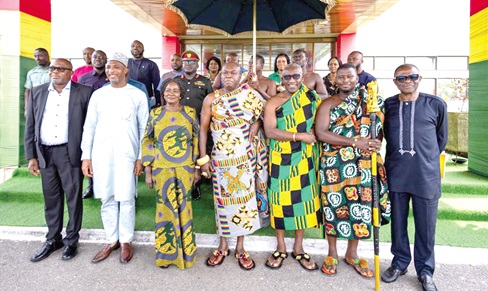The Vice-President, Prof. Naana Jane Opoku-Agyemang, has reaffirmed the country’s commitment to combat drug abuse and dismantle trafficking networks, describing the threat of illicit drugs as a major challenge to public health, safety and national development.
She said the country had consistently demonstrated a resolve to tackle the scourge of drugs through a dual strategy of demand and supply reduction interventions.
Speaking at the 2025 International Day Against Drug Abuse and Illicit Trafficking in Accra yesterday, the Vice-President said the country was investing in practical preventive solutions to address the root causes of drug abuse.
Referencing data from the 2024 World Drug Report, Prof. Opoku-Agyemang indicated that 292 million people globally abused drugs in 2022 alone, with 64 million suffering from drug use disorders.
“These numbers are deeply troubling and serve as a call to action. Therefore, we cannot be passive in our approach,” she said.
She commended the Narcotics Control Commission (NACOC) for its recent achievements, including collaborative and solo operations that had led to the seizure of large quantities of illicit substances and the disruption of organised trafficking networks across West Africa and Europe.
Highlighting a major success, she announced that over 16 metric tonnes of narcotic drugs were destroyed on June 20, 2025, a development she described as “proof that we are active in this fight”, adding that “every gramme destroyed is a life potentially saved”.
She said the government was committed to support the commission and its allied institutions by providing the tools, training, and resources necessary to stay ahead of the evolving threats.
She warned that “while we pursue traffickers and disrupt their networks, we must not neglect the individuals and communities who suffer the consequences of addiction”.
Prof. Opoku-Agyemang praised the directive issued by the Minister for the Interior to operationalise the Substance Use Disorder Rehabilitation Fund as provided in the Narcotics Control Commission Act, 2020 (Act 1019) to ensure increased access to treatment and reintegration for individuals battling substance use disorders.
Day
NACOC organised the local version of the Word Drug Day on the theme: “The Evidence is Clear: Invest in Prevention”.
The United Nations (UN) international day is observed annually on June 26, since 1989.
It serves as a global reminder of the urgent need to combat the drug menace through coordinated action, awareness, and rehabilitation.
The event brought together representatives from government, civil society, international partners, law enforcement agencies, recovering individuals, and communities affected by drug addiction, each of them a stakeholder in Ghana’s fight to protect its youth and safeguard its future.
Advice
Indeed, the Vice-President advised Ghanaians to be mindful of the broader implications of drug abuse, drug trafficking and other forms of organised crime, insisting that the complex mix of illicit drug trade, drug abuse and organised crime now included more dangerous opioids.
“We face a more complex challenge as drug trafficking and organised crime syndicates have shifted to include synthetic opioids,” she said.
She said the country had made significant gains in the fight against conventional narcotic drugs such as cocaine, heroin and cannabis through demand and supply reduction interventions.
Prof. Opoku-Agyemang urged organisations to cooperate with the government to prevent the threats of drug trafficking and organised crime.
“If we are to build a stronger, safer, and more prosperous Ghana, we must all recognise the urgency of this issue. Let us, therefore, rise to the occasion to put in place appropriate and pragmatic preventive measures,” she said.
The acting Director-General of NACOC, General M.O. Mantey, appealed to young people to refuse to be used or destroyed by “empty promises from those who trade in death and despair”.
He outlined the devastating ripple effects of the global drug trade, saying it did not operate in isolation but fueled violence, corruption, terrorism, and environmental degradation.
“The global black trade feeds an evil mirror of organised crime, and unfortunately, it preys on our youth and exploits our vulnerabilities.
This is a national emergency, and Ghanaians are not powerless,” he added.
Collective efforts
The Akwamuhene, Odeneho Kwafo Akoto III, who chaired the event, stressed the need to strengthen collective resolve to prevent drug abuse and protect the communities, especially young people, from the grip of drug abuse and addiction.
He announced steps from his traditional area to include the allocation of 100 acres of land to the NACOC to establish a training school for young persons and other professionals to fight and support the country’s fight against drug trafficking and drug abuse.
The head of the United Nations Information Centre in Accra, Cynthia Pra, emphasised the need to support and invest in education, treatment, harm reduction measures, eliminate illicit laboratories and offer farmers alternatives.
“Let us recommit to ending drug abuse and trafficking, uniting to dismantle criminal networks and breaking the cycle of suffering and destruction, once and for all,” she said.

